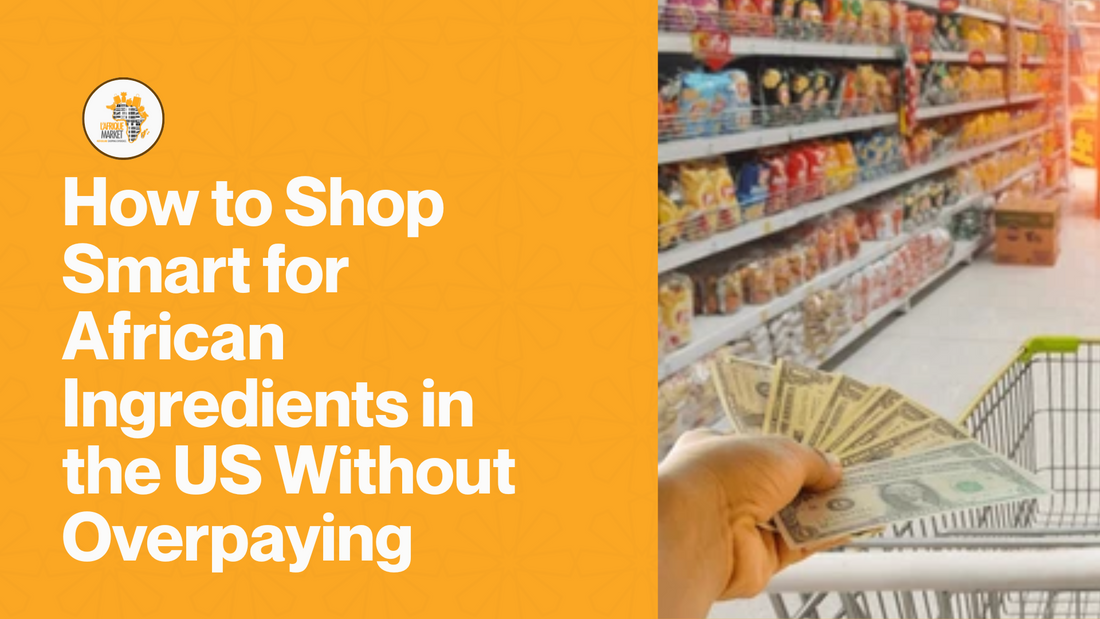
How to Shop Smart for African Ingredients in the US Without Overpaying
Share
African cuisine is vibrant, diverse, and packed with bold flavors that tell stories of rich culture and heritage. Whether you're cooking jollof rice, egusi soup, or fufu, using authentic ingredients is essential to truly capture the essence of these dishes. However, shopping for African ingredients in the US can sometimes be daunting and expensive, especially if you don’t know where to look or how to shop smart.
Here’s a comprehensive guide to help you find authentic African ingredients without overspending, so you can enjoy cooking your favorite dishes without breaking the bank.

Image from: Tamborasi
Also read: How L'Afrique Market is Preserving Culture Through Food
1. Know What You Need
Before heading out, make a list of essential ingredients for your recipes. Common staples include:
- Palm oil
- Cassava flour
- Plantain flour
- Egusi seeds
- Dried fish and stockfish
- Scotch bonnet peppers
- Okra
- Various spices like suya spice or berbere
- Beans like black-eyed peas or cowpeas
Knowing exactly what you need helps prevent impulse buys and ensures you only purchase what you will use.
2. Shop at Specialized African Markets
African markets are your best bet for finding authentic ingredients at reasonable prices. These markets often source products directly from Africa or trusted local suppliers, ensuring the availability of fresh and traditional items.
Look for markets like L’Afrique Market, which offer a wide selection of African staples under one roof. Shopping here saves you time and money compared to buying fragmented ingredients from multiple stores.
3. Buy in Bulk When Possible
Many African ingredients have a long shelf life, such as dried fish, spices, and flours. Buying these items in bulk can significantly reduce the cost per unit.
Bulk purchasing is especially useful if you often cook African dishes or have a community where ingredients can be shared. Just make sure to properly store your purchases to maintain freshness.
4. Compare Prices Online and In-Store
Don’t settle for the first price you see. Compare prices at local African stores, mainstream supermarkets, and online vendors.
Online shops often run promotions or discounts that may not be available in physical stores. Combining online browsing with in-store visits allows you to find the best deals without sacrificing quality.
5. Understand Seasonal Variations
Some fresh ingredients, like certain greens, vegetables, or fruits, may fluctuate in price depending on the season. Buying seasonal produce means fresher items at a lower cost.
When seasonal prices spike, consider frozen or dried alternatives like dried okra or frozen spinach, which still deliver flavor and nutrition.
6. Learn to Substitute Wisely
Sometimes, authentic ingredients might be hard to find or expensive. Learning acceptable substitutes can save money without sacrificing the essence of your dish.
For example, when you can’t find fresh waterleaf for Afang Soup, substitute with spinach or collard greens. Use dried chili flakes if fresh Scotch bonnets are unavailable.
7. Build Relationships with Shop Owners
Regular customers often get the best advice, deals, and fresh inventory updates. Building relationships with African market owners or staff can lead to insider tips on sales and new stock arrivals.
Plus, they can guide you on less expensive options or how to best use certain ingredients.
8. Utilize Community Resources
Joining African cooking groups on social media or local community groups can expose you to bulk-buy opportunities, vetted vendors, and recipe tips.
Networking with fellow cooks encourages savings and makes cooking your favorite traditional dishes more accessible.
Why Choose L’Afrique Market?
At L’Afrique Market, you’ll find a one-stop shop experience tailored to African cooking needs. Their broad selection of authentic ingredients—from fresh vegetables and flours to spices and dried fish—is priced competitively to support your culinary journey.
Shopping at L’Afrique Market means convenience, quality, and peace of mind knowing you’re using genuine, traditional African products—all without overpaying.
